The Samsung 860 PRO (512GB And 4TB) SSD Review: Replacing A Legend
by Billy Tallis on January 23, 2018 10:00 AM ESTRandom Read Performance
Our first test of random read performance uses very short bursts of operations issued one at a time with no queuing. The drives are given enough idle time between bursts to yield an overall duty cycle of 20%, so thermal throttling is impossible. Each burst consists of a total of 32MB of 4kB random reads, from a 16GB span of the disk. The total data read is 1GB.
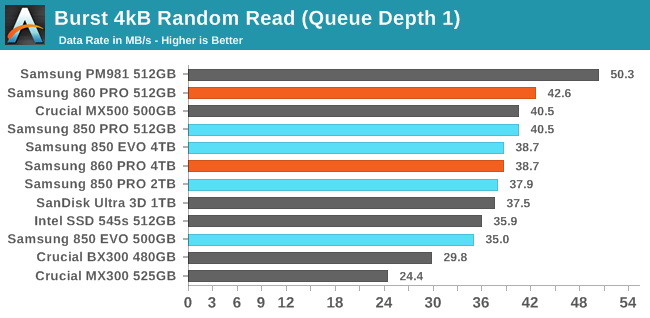
The 512GB Samsung 860 PRO has the fastest burst random read speed among these SATA SSDs, about 5% faster than the 850 PRO. The 4TB model is the same speed as the 4TB 850 EVO.
Our sustained random read performance is similar to the random read test from our 2015 test suite: queue depths from 1 to 32 are tested, and the average performance and power efficiency across QD1, QD2 and QD4 are reported as the primary scores. Each queue depth is tested for one minute or 32GB of data transferred, whichever is shorter. After each queue depth is tested, the drive is given up to one minute to cool off so that the higher queue depths are unlikely to be affected by accumulated heat build-up. The individual read operations are again 4kB, and cover a 64GB span of the drive.
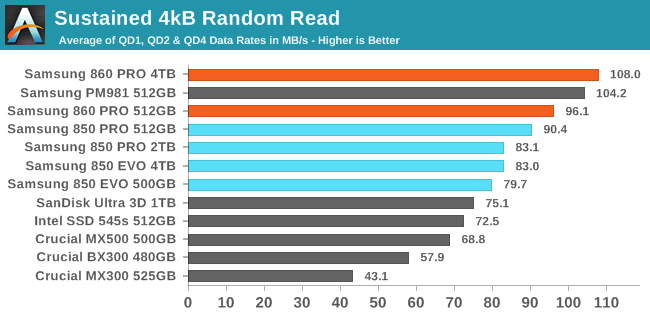
On the longer random read test involving some higher queue depths, the Samsung 860 PROs take a clear lead, and the 4TB model even outperforms the PM981 NVMe SSD.
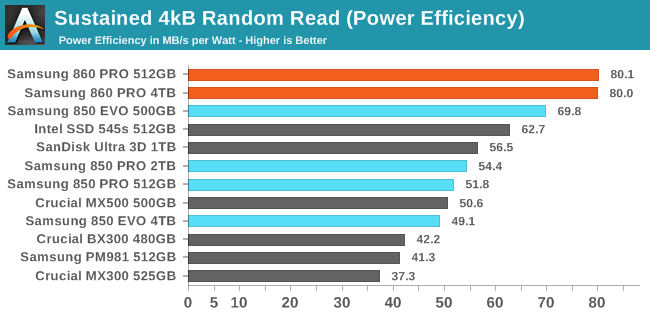
The two Samsung 860 PROs offer the same power efficiency, which is a huge step up from the 850 PRO's efficiency and significantly better than any of the competition.
 |
|||||||||
Most of the Samsung drives hit the same limit of almost 400 MB/s around QD16. The two latest Crucial SSDs only just reach reach that level of performance at QD32, while the Intel 545s and Crucial MX300 never scale up that far. The PM981 NVMe drive scales far beyond any of the SATA drives, but at the cost of very poor power efficiency, especially at lower queue depths.
Random Write Performance
Our test of random write burst performance is structured similarly to the random read burst test, but each burst is only 4MB and the total test length is 128MB. The 4kB random write operations are distributed over a 16GB span of the drive, and the operations are issued one at a time with no queuing.
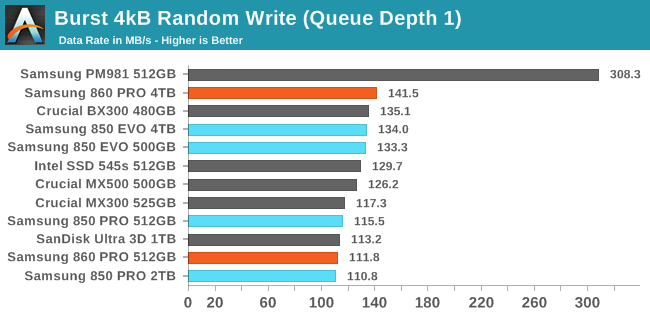
The 4TB 860 PRO has the fastest burst random write speed, while the 512GB model scores slightly worse than the 512GB 850 PRO.
As with the sustained random read test, our sustained 4kB random write test runs for up to one minute or 32GB per queue depth, covering a 64GB span of the drive and giving the drive up to 1 minute of idle time between queue depths to allow for write caches to be flushed and for the drive to cool down.
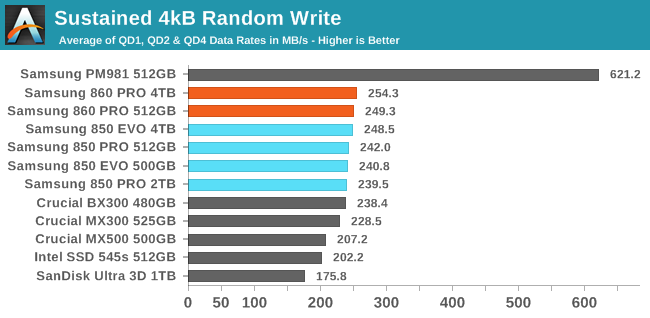
The sustained random write performance of the Samsung 860 PRO is a very slight improvement over their previous drives. Most of the competition is significantly slower on this test, but the Crucial BX300 is pretty close.
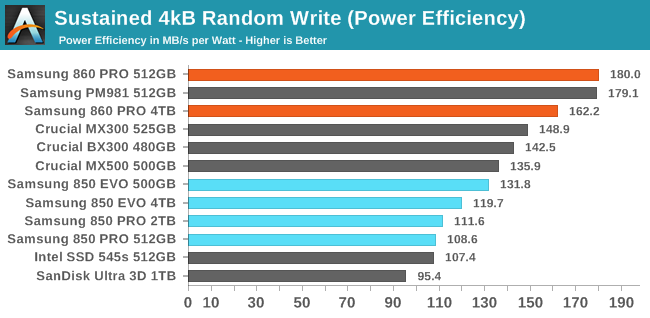
The Samsung 860 PROs are again the two most efficient SATA SSDs, and the 512GB model manages to match the efficiency of the much faster but more power hungry PM981.
 |
|||||||||
The 860 PRO reaches full random write speed at QD4 and is steady through the rest of the test. The Crucial MX500 and Intel 545s are much slower to get up to speed, and the SanDisk Ultra 3D plateaus at a mere 200MB/s after QD2.










64 Comments
View All Comments
Ryan Smith - Tuesday, January 23, 2018 - link
"Are the 256gb and 512gb pcbs the smaller pcb?"Correct. The small PCB shots are the 512GB drive, and the large PCB shots are the 4TB drive.
comma - Tuesday, January 23, 2018 - link
Awesome. Thanks for continuing to take apart the drives and showing us the innards :Dwill2 - Tuesday, January 23, 2018 - link
You included some data on the EVO 860 but no consumption figures ! As the EVO 860 otherwise appears the more cost-effective than the Pro, any chance of adding the 2 Idle figures and the power efficiency for the EVO 860 ?cfenton - Tuesday, January 23, 2018 - link
At this point, I usually recommend whichever drive from a major manufacturer has the lowest $/GB. It's been a while since that was a Samsung drive. I would be astonished if anyone could tell the difference between an 860 Evo and an MX500 in typical client usage, so I don't think it makes much sense to buy the more expensive drive. I'm sure there is a small market that, for some reason, needs the fastest and most durable SATA drives possible, but it's unnecessary for most people.Magichands8 - Tuesday, January 23, 2018 - link
What a joke. Another SSD release crippled with the SATA interface? CHECK. Another SSD offered at the ridiculous $0.50/GB price point? CHECK. Another SSD with woefully low storage capacity? CHECK. Another customer convinced to avoid buying their SSDs? CHECK. Now my money isn't going anywhere near one of these so I admit I didn't read the whole article but just from reading some of the comments it appears that Samsung also managed to reduce both durability AND warranty coverage for this tripe. Samsung's really on a role these days. It's not all bad though, apparently someone in their corporate structure has been using their brains as Samsung has managed to avoid the M.2 format for each of these offerings. What they should have done in addition to giving buyers that special feeling of owning an SSD with the letters "PRO" on it is wrap the drives with flashing multicolored LEDs so the kids can really get their bling bling on! Samsung is definitely taking on 2018 by storm!Round - Wednesday, January 24, 2018 - link
While I agree with most of what you just said, I disagree on SATA. I think SATA drives are great for 90%+ of the population. They work everywhere, they're cheaper, and besides running some fake bench mark tests and moving files on the drive, they give people the same feel/real world performance.NVME is the real rip off in SSDs IMO. Same memory, same format for M.2 SATA/NVME, different controller, but the NVME is significantly more expensive. Why charge so much? No reason other than they can get away with it.
Magichands8 - Wednesday, January 24, 2018 - link
Anyone moving around any data over a couple hundred MB will notice the difference IMMEDIATELY. And there is absolutely, positively, no excuse whatsoever for hogtying a storage technology NATIVELY capable of vastly better performance. The "it's good enough" argument doesn't work any better for SATA vs. PCIE than it did for HDD vs. SSD. We all moved from 32 bit to 64 bit, from HHD to SSD and now we are able to move from SATA to PCIE because the technology for the latter is here, it's present and it has, literally, made SATA obsolete.chrcoluk - Friday, April 12, 2019 - link
if you think sata is obsolete then I assume you dont use netflix, youtube, and other mainstream media services as these services run of spindles not flash storage, the reason been flash storage cannot compete on capacity.For a home user nvme offers little benefit vs sata for ssd's, for a datacentre user, its good for performance sensitive loads such as database caching, but doesnt shine in raw storage capacity.
SATA as long as its good enough for spindles will survive.
For NVME to wipe out SATA ssd's the pricing needs to be improved to match SATA pricing, in addition m.2 form factor is a step backwards, board manufacturers are struggling to fit even only 2 slots per board, and they are a pain to install vs simply slotting in a sata drive into a drive bay.
How often do people move enough data around that the performance of nvme really matters? Most of my writes to my ssd are me downloading games, and the bottleneck in that case is the speed of my internet.
NVME is faster but thats its only win at the moment, it loses on many other things, and because of that SATA is not obsolete.
overseer - Tuesday, January 23, 2018 - link
My Intel X25-M was bought before wedding and it still has 90+% writes left. Guess I may pass it to my grandson...Hixbot - Tuesday, January 23, 2018 - link
What is with the PM981 idle wake up latency. Almost 8 seconds to wake up?!